|
|
 |
 |
 |
 |
 |
Enter your e-mail address
to get free e-mail reports |
|
|
|
|
 |
 |
 |
 |
 |
 |
 |
 |
Daily Reports
IISD Reporting Services (IISD RS) has produced daily reports of selected side events of this meeting. To download our reports please click below on the PDF icons that are next to the dates of your interest. |
|
 |
 |
 |
 |
|
 ENB on the Side - A Special Report on Selected Side Events at the Barcelona Climate Change Talks 2009 ENB on the Side - A Special Report on Selected Side Events at the Barcelona Climate Change Talks 2009
2-6 November 2009 | Barcelona, Spain
Events convened on Monday, 2 November 2009 |
 |
 |
 |
 |
This event brought together members of the Inter-Agency Standing Committee (IASC) Task Force on Climate Change to discuss bringing food insecurity and hunger into the climate change discourse and to present an IASC paper on “Climate Change Adaptation Strategies for Local Impact: Key Messages for UNFCCC Negotiators.”
Saleemul Huq, International Institute for Environment and Development (IIED), said the IASC paper highlights the need for increased agricultural productivity and resilience, improved disaster risk management, social protection schemes for the vulnerable, and community and farm-level action.
Lester Brown, Earth Policy Institute, stressed the critical nexus between population growth and the hydrological impacts of climate change, which are projected to increase food insecurity.
Quamrul Chowdhury, Bangladesh, underscored the particular impacts on least developed countries and small island developing States due to localized food shortfalls, and the global effects of such shortfalls on international food markets.
Balisi Gopolang, Department of Meteorological Services, Botswana, said food security had been included in national communications, addressing the issue through national planning processes. He emphasized that “we either adapt or we die.”
Ama Essel, University of Ghana Medical School, Ghana, emphasized that malnutrition decreases immunity. She stated that addressing the rise in diseases will require large increases in funding in the health sector, especially in developing countries.
Irene Sobotta, International Federation of Agricultural Producers (IFAP), stressed the role of farmers in providing food security and said positive incentives should be used to encourage sustainable farming practices.
Participants also discussed improving water management, population growth, possible conflicts between productivity and resilience, capacity building, and methods of integrating food security into the UNFCCC negotiations.
|
|
 |
 |
 |
 |
|
|
 |
 |
 |
 |
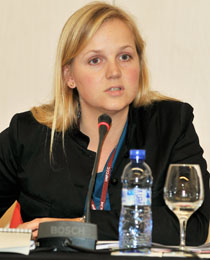 |
| Irene Sobotta, Danish Agricultural and Food Council for International Food Producers Association |
|
 |
 |
 |
 |
|
 |
 |
 |
 |
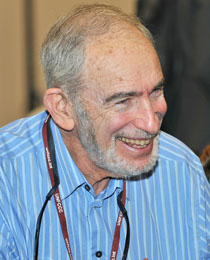 |
| Paul Ehrlich, Stanford University, emphasized during discussions the roles of population growth, consumption in developed countries and climate induced hydrological change, stressing that the best way of reducing vulnerability is reducing birth rates and modifying lifestyles in developed countries. |
|
 |
 |
 |
 |
|
 |
 |
 |
 |
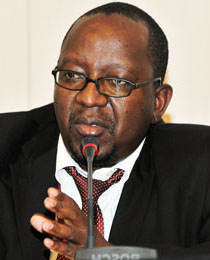 |
| Balisi Gopolang, Department of Meteorological Sciences, Ministry of Environment, Wildlife & Tourism, Botswana |
|
 |
 |
 |
 |
|
 |
 |
 |
 |
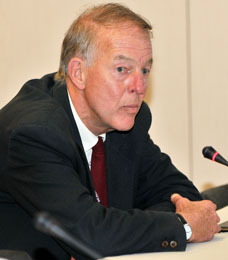 |
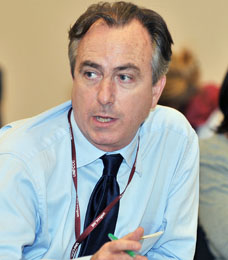 |
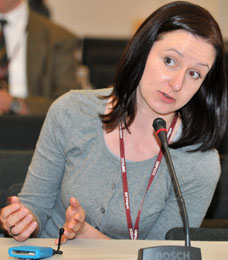 |
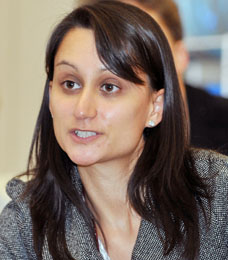 |
| Participants during the discussion. |
|
 |
 |
 |
 |
 |
 |
 |
 |
This event examined how to secure commitments on water in the climate change negotiations and more closely connect the water-climate agendas.
Karin Lexén, Stockholm International Water Institute, described the GPPN initiative, which works with stakeholders to identify and promote key priorities for the international water and sanitation agenda.
Hannah Stoddart, Stakeholder Forum for a Sustainable Future, outlined the GPPN’s work to promote water issues in the climate negotiations. She expressed concern that the latest text under the Ad Hoc Working Group on Long-term Cooperative Action under the Convention (AWG-LCA) no longer had any direct references to water, and outlined proposals to reintroduce text that highlights the critical importance of water to the climate agenda. She stressed linkages with climate adaptation.
Joakim Harlin, Water Governance Programme, UNDP, said millions of people lack access to safe water not because of scarcity in a physical sense, but because they are locked out by poverty, inequality and failures of governance. Noting that water issues tend to be addressed in a sectoral way, he emphasized its cross-cutting nature. He warned of an “adaptation apartheid” emerging due to the lack of means available to poor people to cope with and manage vulnerabilities. He highlighted the coordinating activities of UN-Water and UNDP’s capacity building efforts at the local, national and regional levels.
Joseph Halder, NGO Forum for Drinking Water Supply and Sanitation, highlighted the impacts of climate change on water in Bangladesh, including flood, drought, salt-water intrusion, destruction of aquatic ecosystems, declining groundwater tables and increases in extreme weather patterns.
Participants emphasized the relationship between water and national adaptation programmes of action (NAPAs), the cross-cutting nature of water, the need to include water in the UNFCCC outcomes, and linking water and climate change.
The Water Day to be held on 3 November 2009 was highlighted. The Water Day will focus on water issues, including: water and livelihoods; water, ecosystems and forests; water and land; water and regional / transboundary cooperation; water and gender; and water and energy. For more information contact Stephen Mooney, Stakeholder Forum <smooney@stakeholderforum.org>
|
|
 |
 |
 |
 |
 |
 |
 |
 |
The event considered aid-for-trade and climate change funding, as well as the capacity building needs of least developed countries (LDCs) and small island developing States (SIDS).
Gloria Carrión, ICTSD, introduced the aid-for-trade topic with a review of the financial and human resources required for climate change policies in LDCs and SIDS.
Ana Maria Kleymeyer, ICTSD, outlined overseas development assistance and funding through multilateral and regional development banks impacting mitigation and adaptation.
Vinaye Dey Ancharaz, University of Mauritius, identified complementarities between aid-for-trade and climate change in the areas of trade policy and regulation, trade-related infrastructure, building productive capacities and development.
Jodie Keane, Overseas Development Institute (ODI), discussed mitigation in the agricultural sector in terms of carbon trade (including reducing emissions from deforestation in developing countries, and land use, land-use change and forestry). He also discussed agriculture in the context of carbon market financing and the Clean Development Mechanism, and trade in low-carbon products and services such as biofuels.
Amos Enock Majule, Institute of Resource Assessment, University of Dar Es Salaam, Tanzania, reviewed links between trade and financial mechanisms in Tanzania and Malawi, where the absorptive and institutional capacities limit the impacts of projects.
Participants discussed investment and trade capacities for both mitigation and adaptation, with the understanding that climate change policies often have a lower priority than more immediate economic and social problems.
|
|
 |
 |
 |
 |
 |
 |
 |
 |
This event presented perspectives from developing country experts and negotiators on the current state-of-play in the negotiations.
Martin Khor, South Centre, said the main aim in Barcelona should be progress in the Ad Hoc Working Group on Further Commitments for Annex I Parties under the Kyoto Protocol (AWG-KP). He argued that significant developed country commitments under the AWG-KP should be a prerequisite for movement under the Ad Hoc Working Group on Long-term Cooperative Action under the Convention (AWG-LCA). He expressed concern at the EU’s proposal for a new agreement that would include essential elements from the Kyoto Protocol, since there would be many interpretations of what elements are “essential.” He said developed countries should lead with commitments to deep emissions cuts and large-scale assistance to developing countries.
Ibrahim Mirghani Ibrahim, Sudan, said the G-77/China is seeking implementation of what was agreed under the UNFCCC, Kyoto Protocol and Bali Action Plan. He highlighted the role of civil society in pushing for progress.
Vicente Paolo Yu, South Centre, said the AWG-KP and AWG-LCA tracks should remain separate, and noted the African Group’s statement in negotiations that the AWG-KP should be focusing solely on the level of Annex I commitments for the second commitment period.
Lim Li Lin, Third World Network, said developed countries are proposing bottom-up pledges with lower goals and no aggregate target. She said any attempt to “kill Kyoto” through procedural means should be resisted, and opposed merging the AWG-KP and AWG-LCA processes.
Gadir Lavadenz, Bolivia, said a fair outcome in Copenhagen would include maintaining the Kyoto Protocol.
In response to a question about the impact of the new US administration on the negotiations, Martin Khor said there remained a lack of willingness to take on international legally binding commitments. One participant highlighted the complexity of intellectual property rights and the need to recognize the role of both the private and public sectors.
|
|
 |
 |
 |
 |

 |
 |
 |
 |
UN Framework Convention on Climate Change (UNFCCC) resources
 Official website Official website
 Daily programme Daily programme
 Side Events & Exhibits Side Events & Exhibits
 AWG-KP documents AWG-KP documents
 AWG-LCA documents AWG-LCA documents
 UNFCCC News UNFCCC News
UN resources
 Gateway to the UN System’s Work on Climate Change Gateway to the UN System’s Work on Climate Change
 Informal Thematic Debate of the UN General Assembly on Climate Change as a Global Challenge Informal Thematic Debate of the UN General Assembly on Climate Change as a Global Challenge
IISD RS resources
 IISD RS coverage of the Bangkok Climate Change Talks - 2009, 28 September - 9 October 2009, UN Conference Centre (UNCC), Bangkok, Thailand IISD RS coverage of the Bangkok Climate Change Talks - 2009, 28 September - 9 October 2009, UN Conference Centre (UNCC), Bangkok, Thailand
 IISD RS coverage of the Bonn Climate Change Talks - August 2009, 10-14 August 2009, Bonn, Germany IISD RS coverage of the Bonn Climate Change Talks - August 2009, 10-14 August 2009, Bonn, Germany
 IISD RS coverage of the Bonn Climate Change Talks - June 2009, 1-12 June 2009, Bonn, Germany IISD RS coverage of the Bonn Climate Change Talks - June 2009, 1-12 June 2009, Bonn, Germany
 IISD RS coverage of the UNFCCC Technical Workshop on Increasing Economic Resilience to Climate Change and Reducing Reliance on Vulnerable Economic Sectors through Economic Diversification, 28-30 April 2009, Cairo, Egypt IISD RS coverage of the UNFCCC Technical Workshop on Increasing Economic Resilience to Climate Change and Reducing Reliance on Vulnerable Economic Sectors through Economic Diversification, 28-30 April 2009, Cairo, Egypt
 IISD RS summary report of the Thirtieth Session of the Intergovernmental Panel
on Climate Change (IPCC), 21-23 April 2009, Antalya, Turkey (English: HTML - PDF) (Spanish: HTML - PDF) (Japanese: PDF) IISD RS summary report of the Thirtieth Session of the Intergovernmental Panel
on Climate Change (IPCC), 21-23 April 2009, Antalya, Turkey (English: HTML - PDF) (Spanish: HTML - PDF) (Japanese: PDF)
 IISD RS coverage of the Bonn Climate Change Talks - March/April 2009, 29 March - 8 April 2009, Bonn, Germany IISD RS coverage of the Bonn Climate Change Talks - March/April 2009, 29 March - 8 April 2009, Bonn, Germany
 IISD RS summary report of the UNFCCC Workshop on Integrating Practices, Tools and Systems for Climate Risk Assessment and Management and Disaster Risk Reduction Strategies into National Policies and Programmes, 10-12 March 2009, Havana, Cuba (HTML - PDF) IISD RS summary report of the UNFCCC Workshop on Integrating Practices, Tools and Systems for Climate Risk Assessment and Management and Disaster Risk Reduction Strategies into National Policies and Programmes, 10-12 March 2009, Havana, Cuba (HTML - PDF)
 IISD RS coverage of the UN Climate Change Conference - Poznań, 1-12 December 2008, Poznań, Poland IISD RS coverage of the UN Climate Change Conference - Poznań, 1-12 December 2008, Poznań, Poland
 IISD RS coverage of AWG-LCA 2, second part of the AWG-KP 5, and twenty-eighth sessions of the SBSTA and the SBI of the UNFCCC, 2-13 June 2008, Bonn, Germany IISD RS coverage of AWG-LCA 2, second part of the AWG-KP 5, and twenty-eighth sessions of the SBSTA and the SBI of the UNFCCC, 2-13 June 2008, Bonn, Germany
 IISD RS climate and atmosphere page IISD RS climate and atmosphere page
 Climate-L - A mailing list for news on climate change policy Climate-L - A mailing list for news on climate change policy
 Linkages Update - Bi-weekly international environment and sustainable development news Linkages Update - Bi-weekly international environment and sustainable development news
 MEA Bulletin - Newsletter on key MEAs and their secretariats MEA Bulletin - Newsletter on key MEAs and their secretariats
 Climate Change Policy & Practice - News and information on the actions of international organizations in responding to the problem of global climate change Climate Change Policy & Practice - News and information on the actions of international organizations in responding to the problem of global climate change
 African Regional Coverage African Regional Coverage |
|
 |
 |
 |
 |
|
|
 |
 |
 |
 |
 Please e-mail the Digital Editor should you have any questions regarding the content of this page Please e-mail the Digital Editor should you have any questions regarding the content of this page |
 |
 |
 |
 |
|
|
|